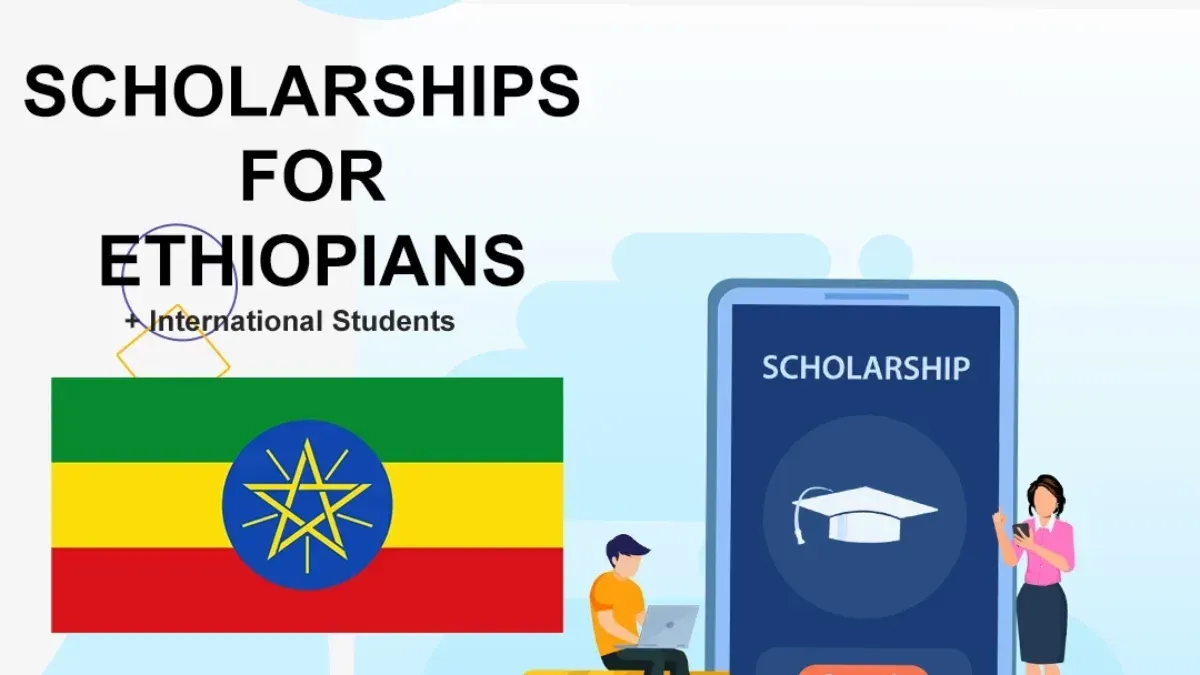Scholarships for Ethiopian Students – Are you considering attending school in Ethiopia but are concerned that you won’t have the money to finish? Don’t worry any longer. Ethiopian universities accept applications from international students for scholarships that are available on a global scale.

If they are unable to pay for their studies on their own, international students can apply for a variety of scholarships to study in Ethiopia, including those for master’s degrees, Undergraduate, and Ph.D. programs.
Various Types of Scholarships for Ethiopian Students
Ethiopian students can choose from a number of scholarships to further their education either domestically or overseas. Below are a few scholarships you might want to look into:
Ethiopian Government Scholarships
Through several departments and organizations, the Ethiopian government provides numerous scholarships to Ethiopian students. These grants, which can be used for a variety of academic subjects, are typically given based on academic achievement.
Mastercard Foundation Scholars Program
Through this program, deserving Ethiopian students can get scholarships if they have shown leadership potential and a desire to improve their communities. It also provides complete financial aid, which covers tuition, living expenses, books, and an allowance.
African Union Commission Scholarships
For undergraduate and graduate study in a variety of fields, the African Union Commission provides scholarships to Ethiopian students. The development of Africa’s regions is one of the goals of these scholarships.
DAAD Scholarships
Ethiopian students can study in Germany on scholarships provided by the German Academic Exchange Service (DAAD). These financial aid programs offer support for living expenses, tuition, and health insurance costs across a variety of academic fields.
Fulbright Program
Students from Ethiopia can apply for scholarships through the Fulbright Program to study and conduct research in the US. These financial aid packages include tuition, flights, housing costs, and health insurance.
Aga Khan Foundation Scholarships
For undergraduate and graduate study in a variety of subjects, Ethiopian students are eligible for grants from the Aga Khan Foundation. A combination of academic achievement and financial need determines who receives these awards.
Commonwealth Scholarships
Ethiopian students can study abroad on scholarships provided by the Commonwealth Scholarship Commission. The cost of living, travel, and tuition are all covered by these scholarships.
Chevening Scholarships
The UK government sponsors the prestigious Chevening Scholarship program. For one-year master’s programs in the UK, it offers scholarships to Ethiopian students.
It’s critical to keep in mind that scholarship options can change by year, along with qualifying requirements and application processes. Also, For the most recent and correct information on eligibility conditions and submission dates, it is advised to consult the official websites of these scholarship programs.
Eligibility Criteria and Application Process for the Scholarships
Depending on the particular scholarship program or provider, the requirements for qualifying and the application procedure can change for scholarships for Ethiopian students. Here are some broad principles to bear in mind, though:
Research and Identity Scholarships
Start by investigating and locating scholarships that are accessible to students from Ethiopia. Look for scholarships provided by organizations, foundations, governments, and educational institutions. Investigate websites, and scholarship databases, and get in touch with pertinent organizations to learn more about eligibility requirements and application processes.
Check Eligibility Criteria
To find out if you qualify, carefully review the eligibility requirements for each scholarship. Academic standing, major, citizenship, financial necessity, leadership abilities, and extracurricular activity are typical admission criteria. Before moving further with the application, make sure you meet the required eligibility requirements.
Prepare Required Documents
Prepare the required paperwork in accordance with the scholarship conditions. Academic transcripts, recommendation letters, personal statements, essays, evidence of language ability, financial records, and identification documents are a few examples. Also, Verify that your documents adhere to the required format and are current and well-organized.
READ ALSO!!!
- Doodle for Google Scholarship: Application Details 2023
- Yale University Scholarships: Empowering Excellence in Education
- College Scholarships in the Philippines For Students
- Scholarships in Germany Scheme: Application and Process
Begin the Application Process
Follow the application instructions provided by the scholarship source. This could entail submitting documents electronically, mailing in paper copies, or filling out an online application form. Additionally, Read the application guidelines carefully and pay attention to any particular directions or additional requirements that are listed.
Personal Statements/Essays
Essays or personal statements may be required for some scholarships. Also, Spend some time developing a strong and well-written letter or essay that highlights your accomplishments, your objectives, and the way the scholarship supports your dreams. Adapt your statements to the particular specifications or questions of each scholarship.
Letters of Recommendation
Ask your professors, teachers, or mentors who are familiar with your academic or professional accomplishments for letters of recommendation if the scholarship asks for them. Additionally, Don’t forget to give them enough time to draft and submit the letters on your behalf. Any information or guidelines the scholarship provider has supplied should be given to them.
Submit the Application
When you have finished assembling all the required application materials, submit your application before the deadline. Make sure your application is comprehensive and that all necessary documents are included. If submitting online, pay close attention to the submission guidelines.
Follow-Up and Await Results
Keep note of any communications or changes from the scholarship organization after you’ve submitted your application. Also, as part of the recruitment process, they could ask for more details or do interviews or assessments. Communicate with the scholarship giver in a timely and effective manner.
READ ALSO!!!
- Doodle for Google Scholarship: Application Details 2023
- Yale University Scholarships: Empowering Excellence in Education
- College Scholarships in the Philippines For Students
- Scholarships in Germany Scheme: Application and Process
Scholarship Award and Acceptance
You’ll get a notification or offer letter if you’re chosen for a scholarship. The scholarship’s terms and conditions, including any obligations or demands, should be carefully reviewed. As soon as possible, decide whether to accept or reject the scholarship offer before the deadline.
Conclusion
Ethiopian students can improve their chances of receiving funding to further their studies by researching scholarship options, actively completing and submitting applications, and other related actions.
It’s essential to note that each scholarship program may have specific guidelines and requirements. Therefore, it is crucial to carefully review the instructions provided by the scholarship provider and reach out to them directly if you have any specific questions or need further clarification.







